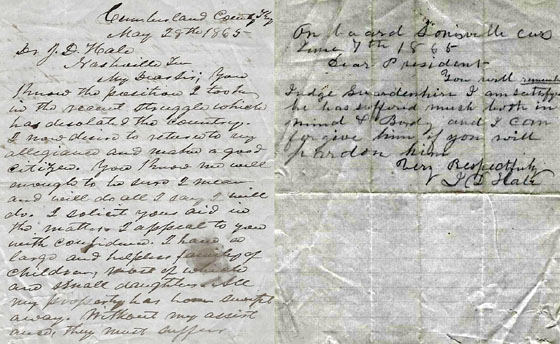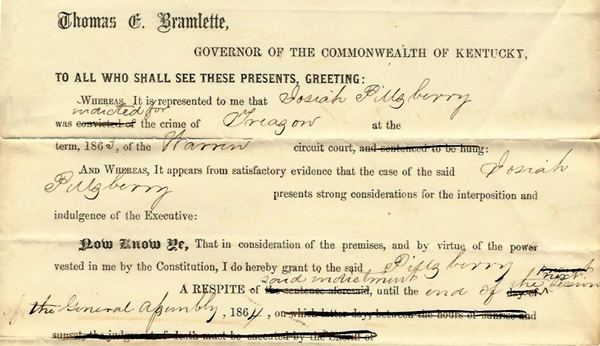
As we know, there’s a lot more to the pardon process than simple justice. We’ve previously blogged about two Civil War-era pardon requests from Bowling Green and Burkesville, but here’s another 19th-century Kentucky pardon story, plus a new detail about its history found in a letter in WKU’s Department of Library Special Collections.
Born in Vermont in 1817, Delia Ann Webster moved to Lexington, Kentucky in 1843 to establish a school for young women. Educated herself in the abolitionist atmosphere of Oberlin College, she become a thorn in the side of local slaveholders, who rightly suspected her of participation in the Underground Railroad. Arrested after helping a family of African Americans escape to freedom in Ohio, Webster was tried and convicted of the crime of assisting fugitive slaves. In December, 1844 she received a two-year prison sentence, the first woman to receive such punishment.
Nevertheless, the trial jury petitioned Governor William Owsley to pardon Webster because of her sex. At first, Webster would not accept clemency and demanded a new trial. By the time she warmed to a pardon, public opinion had turned against her and she was carted off to prison in January, 1845.
But on February 24, Webster was suddenly released, the beneficiary of a “Free and Full” pardon. During the negotiations, which had continued after she entered prison, one of the stipulations was that Webster leave Kentucky forever. But in her later account of her ordeal, she attributed her release to little more than “a friendly feeling” on the part of Governor Owsley and insisted that she had refused to accept the condition of permanent exile from the state. “I could not think of pledging myself never to return,” she wrote.
Or could she? In the papers of Governor Owsley’s grandson Robert Rodes, a Bowling Green, Kentucky lawyer and state legislator, we find a handful of his correspondence. Included is a letter dated February 19, 1845, five days before Webster’s release from prison. Engrossed with the colorized countenance of Henry Clay, it reads:
Gov. of the State of Ky.
His Excellency William Owsley
I am sorry if I gave you an impression that I was not exceedingly anxious for a pardon. It is entirely erroneous. And if you will send me a Pardon or Respite, I will pledge you my word to leave your State never to return.
Delia A. Webster
In any event, Webster did not honor her pledge. After a few years at home in Vermont, she bought a farm in Trimble County, Kentucky and resumed her activities with the Underground Railroad until driven off by angry locals.
There’s way more to the story of Delia Webster—for example, the scandalous letters sent to her by the lovesick warden of the prison where she had resided in her own private cottage. “They are quite amorous,” wrote Robert Rodes to his wife after they were published in the newspaper. “You must criticise them and give me some strictures in my communications to my love.” But Delia Webster’s contrite letter to Governor Owsley, part of the Rodes Collection in WKU’s Department of Library Special Collections, shows that there may be more to her notorious pardon than previously understood.
Search TopSCHOLAR and KenCat for more about our collections.


